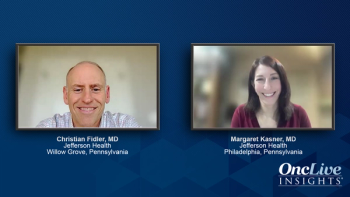Articles by Christian Fidler, MD

Panelists discuss how treating secondary AML in the community setting requires a multifaceted approach, emphasizing early diagnosis, risk stratification, timely referral when necessary, and close collaboration with academic centers to provide optimal patient care.

Panelists discuss how the decision to refer a patient with secondary AML from community practice to an academic or specialized leukemia program should be based on a combination of disease complexity, treatment requirements, and the community center's capabilities, while emphasizing the importance of ongoing collaboration and education to enhance patient care across all settings.

Panelists discuss how community settings face unique challenges in delivering intensive chemotherapy regimens for secondary AML, including limited resources and expertise, but can implement best practices and leverage potential benefits of community-based care to provide effective treatment.

Panelists discuss how the NCCN guidelines recommend intensive chemotherapy options, including traditional 7+3 and CPX-351, for newly diagnosed high-risk or secondary AML patients, with treatment selection based on individual patient factors and potential adverse effects.

Panelists discuss how identifying candidates for allogeneic transplant in secondary acute myeloid leukemia involves a comprehensive assessment of disease characteristics, patient factors, and timing considerations, while also evaluating fitness for intensive chemotherapy induction using specific criteria to guide treatment decisions.

Panelists discuss how involving patients and caregivers in the treatment decision-making process for secondary acute myeloid leukemia (AML) requires clear communication, education about options, and consideration of individual values and preferences to ensure informed and shared decision-making.

Panelists discuss how comprehensive molecular and cytogenetic testing at diagnosis is crucial for accurate risk stratification, treatment selection, and prognostication in secondary acute myeloid leukemia (AML), while acknowledging the challenges of obtaining timely results, especially in community settings.

Panelists discuss how secondary acute myeloid leukemia (AML) generally carries a poorer prognosis compared to de novo AML, necessitating careful consideration of treatment goals and open communication with patients about their outlook.

Panelists discuss how secondary acute myeloid leukemia (AML) presents unique challenges in diagnosis, classification, and treatment due to its complex pathogenesis and evolving classification criteria.


